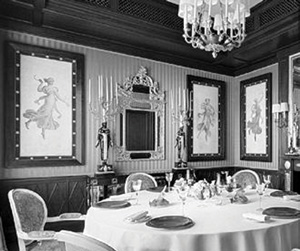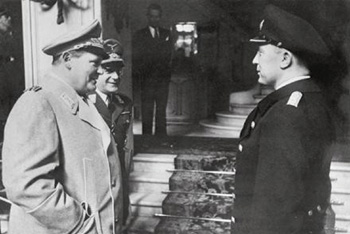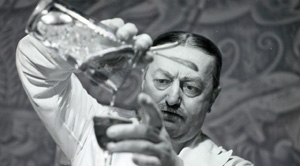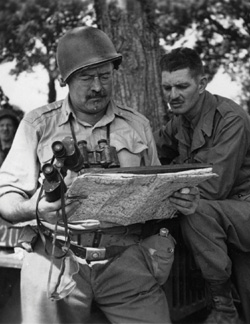|
A GRENADIER DINNER AT THE RITZ, 25th SEPTEMBER 1944
by Alan Ogden
formerly Grenadier Guards
|
It was a spur of the moment plan. As the battle for Normandy came to an end, on 25th September 1944 four Grenadier officers of 2nd (Tank) Battalion were told they could have two days off ‘by the sea’ and, even better, the loan of a staff car. A quick council followed and within minutes Lord (Peter) Carrington, Teddy Denny, Neville Berry and David Fraser unanimously decided to go to Paris, which was rumoured to be on the verge of liberation.
Since 19th July, the day they disembarked in Normandy, the three Grenadier Battalions (1st, 2nd and 4th) had been engaged in sporadic but heavy fighting. At Cagny, the 2nd Battalion had lost 22 tanks with 37 killed in action and 41 wounded. Later at Drouet Hill and in Viessoix village, fierce German resistance had been encountered. In all, ten Grenadier officers had been killed or died of wounds. By any measure it was a well-deserved break for the four young men.
Although the youngest and most junior of the group, Fraser soon became the expedition leader for he had lived in Paris before the war when his father, Brigadier the Hon Willie Fraser, had been Military Attaché there. With a Union Jack pennant flying on the car’s flag holder, their route took them through Alençon and Chartres, encountering long straggling American columns along the way, until they arrived at the Place L’Étoile around eight that evening.
By now the city heaved with enthusiastic crowds and FFI ‘freedom fighters’, bringing traffic almost to a stand-still as the main body of General Leclerc’s 2nd French Armoured Division arrived. Another hasty council was convened, and another unanimous decision reached – to the Ritz Hotel on the Place Vendôme!
Under its neutral Swiss ownership, the Ritz had remained open throughout the German occupation. Its clientele had included Reichsmarschall Göring, who made it the headquarters of the Luftwaffe, Hitler’s favourite art dealer Karl Haberstock, and General von Stülpnagel, one of the officers behind the 20th July plot to assassinate Hitler. The last senior German officer, General von Choltitz, the military governor of Paris, had left the hotel as late as 23 August after issuing a friendly warning to General Eisenhower to get to the city as quickly as possible before demolitions started.

Ritz Hotel dining room in the 1940s
|
 Hermann
Hermann Göring outside the entrance to Ritz Hotel |
Given a suite of rooms by Claude Auzello, the managing director, who graciously accepted Berry’s undertaking that Kemsley Newspapers would cover their costs, after quaffing several glasses of Perrier-Jouët champagne, the four officers headed for the dining room where they ordered dinner. Apart from being interrupted by an air raid siren which caused undue alarm, it turned out in Carrington’s words to be ‘a perfectly tolerable dinner’.
In the bar they recognised the rambunctious American war correspondent Ernest Hemingway who, in league with Colonel David Bruce of the OSS, had been one of the first Americans to reach Paris earlier that evening. A pre-war habitué of the hotel and determined to single-handedly drain the cellar dry, Hemingway was later observed drinking like water the Château Cheval Blanc Premier Grand Cru which had been successfully hidden from the Germans for four years. No wonder the pithy adage ‘if I die and go to Heaven, I would like it to resemble the bars of the Ritz Paris’ has been attributed to him.

Frank Meier - the barman in August 1944
|
 Hemingway on the road to the Ritz hotel in Paris
Hemingway on the road to the Ritz hotel in Paris
|
There is a story recounted by Tilar Mazzeo in The Hotel on Place Vendôme that when Hemingway arrived at the Ritz, he found ‘some forward-thinking British troops had arrived an hour earlier and were planning to set themselves up in residence’. He ordered them out on the street, barking his commands in German and they obeyed him. They were certainly not Grenadiers!
Much to their surprise, the Grenadier officers also spotted the elegant figure of Captain Sir Richard Powell of the Welsh Guards coming into the hotel through the Place Vendôme door, wearing what looked like a suit of overalls and with a rifle slung casually over his shoulder. Three weeks earlier Powell had been presumed dead after his helmet had been recovered from a German RAP along with the bodies of two Welsh Guardsmen. He had in fact been captured but managed to escape and make contact with the Maquis who smuggled him into Paris.
The next morning, Fraser escorted his fellow officers to the British Embassy in Rue Faubourg St Honoré, keen to discover what had happened to his parents’ furniture which had been hastily stored there in 1940. Greeted with astonishment by Mr Christie, one of the Embassy’s old expatriate porters, they were regaled with tales of Göring trying to take over the Embassy as his Paris residence and Fraser was relieved to find that his family’s possessions had all survived their wartime storage. Before they left, they signed the visitors’ book, the first Englishmen to do so since 1940.
On the way back to Flers just south of Falaise, they were somewhat alarmed to see the Guards Armoured Division trundling down the road towards them and when they reached the battalion at Vernon some 125 miles from where they had left it, they were greeted with news that it was about to cross the Seine. Unable to restrain themselves, they explained ‘we’ve been crossing and re-crossing it for the last forty-eight hours by the Pont Alexandre III and the Pont de l’Alma!’.
On 12th September 2019, Lord Llewellyn, HM Ambassador in Paris, hosted a reception and dinner to commemorate the 75th Anniversary of the liberation of Paris to which he invited the descendants of the four Grenadier officers.
Photocredit
eutouring.com/the_ritz_paris_hotel_history.html
|
|




